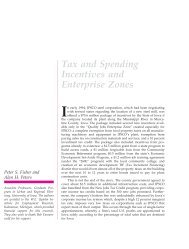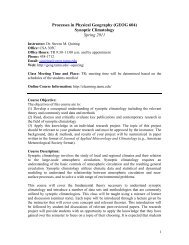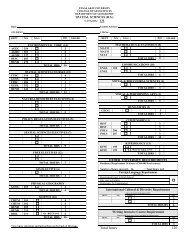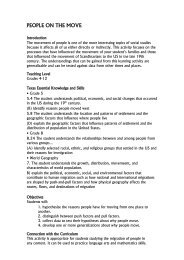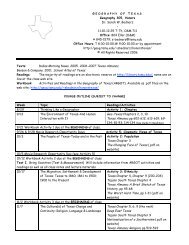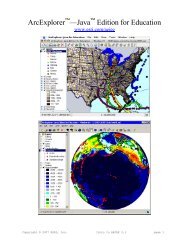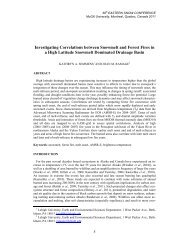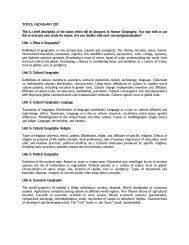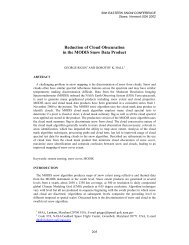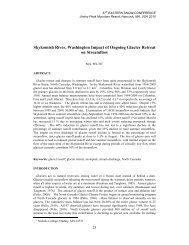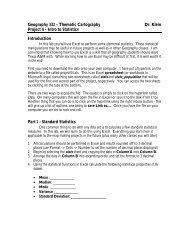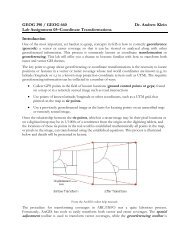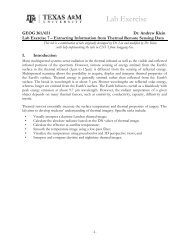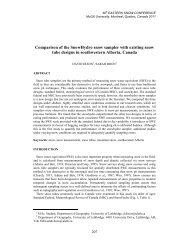Texas Social Studies Framework - Department of Geography ...
Texas Social Studies Framework - Department of Geography ...
Texas Social Studies Framework - Department of Geography ...
You also want an ePaper? Increase the reach of your titles
YUMPU automatically turns print PDFs into web optimized ePapers that Google loves.
56<br />
56<br />
Some types <strong>of</strong> assessment are more appropriate to<br />
measure certain TEKS-based student learning than<br />
others. Traditional tests, fill-in-the-blank questions, and<br />
multiple choice selections assess what students know,<br />
and these can satisfy expectations in the TEKS that call<br />
for students to “identify,” “give examples <strong>of</strong>,” or “organize.”<br />
Well written, thoughtful multiple choice questions<br />
can force students to compare information in order to<br />
select the correct answer. Other assessments may be<br />
needed to evaluate the extent to which students can<br />
“define,” “summarize,” “explain,” “analyze,” “compare,”<br />
or “apply.” Performance assessments can measure these<br />
types <strong>of</strong> student performances on higher level learning<br />
tasks. (See Figure 26.)<br />
How can teachers best determine whether their students<br />
meet TEKS expectations? Part <strong>of</strong> the answer to this<br />
question lies in selecting the appropriate type <strong>of</strong> student<br />
assessment.<br />
Traditional Assessments<br />
Informal Checks for Understanding<br />
Informal checks include hand signals, index card summaries/questions,<br />
question box/board, analogy prompt, web/<br />
concept map, misconception check, i.e., asking students<br />
to agree or disagree and to explain their responses.<br />
Example: A first grade teacher assesses students’ understanding<br />
<strong>of</strong> goods and services by giving verbal examples<br />
<strong>of</strong> goods and services. She asks students to hold up one<br />
finger if they think the example is a good and two fingers<br />
if they think the example is a service (TEKS 1. 7 A).<br />
Observation/Dialogue<br />
These include think/pair/share, conference, class discussion,<br />
monitor, observation with annotations, i.e., asking<br />
Chapter 5: The Teaching-Learning System: Curriculum, Instruction, and Assessment<br />
students to consider their individual response, discuss<br />
their response with a partner, and share salient responses<br />
with the whole class. Example: A fourth grade teacher<br />
uses think/pair/share to assess students’ understanding <strong>of</strong><br />
economic interdependence by asking students to consider<br />
how life would be different if <strong>Texas</strong> could not receive<br />
any economic goods from the United States or the rest <strong>of</strong><br />
the world (TEKS 4. 14 C).<br />
Quiz/Test<br />
Types include multiple choice, pop quizzes, open-book<br />
essay, oral exam, reports, and labs designed to check the<br />
student’s breadth <strong>of</strong> knowledge, i.e., released TAAS<br />
exams, end-<strong>of</strong>-chapter short answer questions. Example:<br />
A high school world history teacher administers a 20<br />
question quiz to assess her students’ knowledge <strong>of</strong> factual<br />
information about the scientific discoveries and technological<br />
innovations that made possible the era <strong>of</strong> European<br />
exploration and discovery (TEKS World History 23 A).<br />
Performance Assessments<br />
Academic Prompt<br />
An academic prompt is an assessment <strong>of</strong> academic<br />
content knowledge or skill in a response to a specific<br />
prompt, i.e., TAAS writing, Advanced Placement (AP),<br />
or Scholastic Aptitude Test (SAT) performance task<br />
questions such as comparisons between two authors,<br />
theories, or events. Example: An eighth grade teacher<br />
assesses students’ knowledge <strong>of</strong> issues leading to the<br />
Civil War by asking her students to compare the Compromise<br />
<strong>of</strong> 1820 and the Compromise <strong>of</strong> 1850 (TEKS 8. 7 D).<br />
Figure 26: Multiple Methods <strong>of</strong> Assessment: From Least to Most Complex<br />
Least Complex Most Complex<br />
a b c d e f g h<br />
TRADITIONAL ASSESSMENTS<br />
a. Informal Checks for Understanding<br />
b. Observation/Dialogue<br />
c. Quiz/Test<br />
PERFORMANCE ASSESSMENTS<br />
d. Academic Prompt<br />
e. Performance Task<br />
f. Authentic Task<br />
g. Long-Term Project<br />
h. Portfolio



